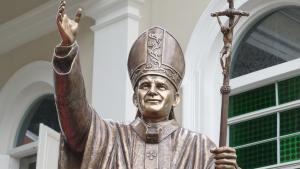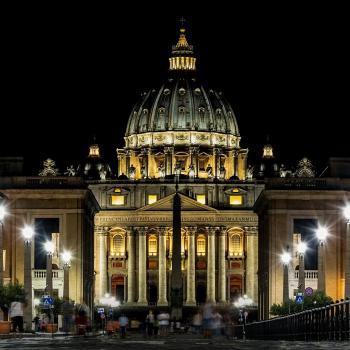
Who gets to say that their interpretation of Scripture is right? How do we determine which doctrinal claims are true and which ones are false? These questions could be asked by anyone inside or outside of the church. The questions would come with different presuppositions depending on who is asking. In this article, I want to look at how a Roman Catholic would ask these questions.
In Protestant circles, we appeal to the Scriptures alone as our final authority on Christian teaching and practice. We say that an interpretation is a good one insofar as it conveys what the Scripture conveys. However, this sort of answer usually misses the point of the question. The Roman Catholic questioner is usually concerned not just with the possibility of getting the right interpretation. He is concerned about who has the final (and infallible) say regarding the truth or the falsity of an interpretation or doctrine.
Another way to formulate the question is as follows: Who do I listen to in order to get the infallibly right answer about Christian teaching?
Lots Of Interpretations
To be sure, not everyone can be correct in their interpretation of Scripture. There are plenty of disagreements about what the Bible teaches. Some of those disagreements involved mutually exclusive claims. Some interpretations are embarrassingly foolish. For example, a lay Christian explained to me that overweight people are more capable of expressing the glory of God. Why would he say this? It turns out that he found a Greek dictionary that informed him that the word for “glory” meant “weighty”. He concluded from this that overweight people have a greater capacity to carry the glory of God.
It is bad enough that a single person would be this misguided. But this kind of sloppy interpretation is common – ridiculously common!
There is more agreement and much more thoughtful analysis from Biblical scholars. But in the end, there are plenty of disagreements among Biblical scholars as well. Many Bible scholars don’t even believe the supernatural claims of the Bible. Thus the question initially posed becomes all the more pertinent. If we can’t trust lay Christians to give us infallible answers about the truths of Christianity and we can’t trust Bible scholars for infallible answers, then how do I know that we are right about our Christian beliefs?
Two Potential Answers
The Roman Catholic answer is something like this: God did not leave us without a living infallible authority. The teaching authority of the Roman Catholic church ensures that we know who to look to for the correct interpretations of Scripture.
The Protestant answer varies, but the possible alternative I want to pose in this article is something like this: It would be wonderful if the Roman Catholics were right. Unfortunately, it doesn’t seem like they have the charism of infallibility. All of us, then, is in the position of reading the Scriptures with fallible friends, teachers, and religious leaders to help us sort out the claims of Christianity.
A Simplistic Catholic Frame of Mind
At first glance, the Roman Catholic thinks of religious teaching authority in terms of the ability to produce infallible results. When he looks at Protestant “religious authorities” he tends to see them as pseudo-authorities. Protestant pastors may have the garb of religious authority in more liturgical traditions, but they don’t have any real authority.
This rendering of the Protestant situation seems all the more confirmed when we consider the doctrines of the “priesthood of all believers” and the “perspicuity of Scripture”. Accordingly, all believers have the right and responsibility to read and understand the Scriptures. But no Protestant has the right to obligate another Protestant to hold to a particular doctrine. At least not in the way that the Roman church’s teaching authority can obligate its members.
In keeping with traditionally Protestant principles, a pastor can persuade others by use of Scripture and reason, but he cannot impose an interpretation by right on another believer. If a Roman Catholic has this “ability to produce infallible results” in mind as the criterion for ecclesiastical authority, then Protestants have to admit that this sort of authority does not exist in the Protestant church.
Catholic Category Expanded
If we look more carefully though, Roman Catholics do have the conceptual framework for thinking about obedience to church authorities apart from infallible pronouncements. As we can see in Donum Veritatis, the faithful have obligations to church authorities even when they are not speaking infallibly.
It is also to be borne in mind that all acts of the Magisterium derive from the same source, that is, from Christ who desires that His People walk in the entire truth. For this same reason, magisterial decisions in matters of discipline, even if they are not guaranteed by the charism of infallibility, are not without divine assistance and call for the adherence of the faithful. -emphasis mine.
Thus when a Protestant affirms that real authorities exist in the Protestant church, the Roman Catholic should have the conceptual resources for understanding this claim. Roman Catholics themselves have a notion of obeying authorities even when those authorities are not acting with the charism of infallibility. It is at least possible that Protestants leaders have this sort of authority.
Protestant Authority: Examples
Protestant church leaders are not infallible. Rather they have the authority to lead their churches in a way that is similar to other non-Christian institutions. They make decisions regarding:
- Hiring and firing for positions in the church
- Ministries that will and will not be supported
- What the church website should contain and look like
- What to do with the money that comes into the church
- Salaries for church leaders
But they also make decisions about the spiritual direction of the church. They are said to obtain this authority by being “called to the ministry”. In more hierarchically ordered denominations a church leader would need to go through a process of ordination. In these cases, a person is vetted by others to determine if that person is fit for ministry. But there are a good number of churches with leaders who are self-appointed religious authorities.
Protestant Spiritual Authority
All authority comes from God. This includes civil and religious authority.
Rom 13:1 Let every person be subject to the governing authorities. For there is no authority except from God, and those that exist have been instituted by God.
If Protestant leaders have authority, then that authority is from God. It would be hard to deny that they have some sort of authority within their congregations. Some charismatic Pentecostal churches, for example, think their pastor has a kind of prophetic authority (although it too is fallible). Larger denominations, like the Southern Baptists, have a hierarchical leadership structure that can decide what all Baptist churches should believe and or do to remain in the Southern Baptist Convention. Pastors, in general, are thought to have the authority to spiritually admonish those in their congregation.
Ground of Authority
The question of what grounds authority is a difficult topic. In the case of church leadership though, Protestants, Catholics, and Orthodox can agree on the ultimate source of religious authority. God gives church leaders the authority that they have. The disagreement is in the means. How does God give church leaders authority? Is it through apostolic succession? Does it come through a private calling that other people recognize?
Admittedly, in the Protestant literature I have read, details on what grounds the authority of church leaders was not super clear to me. There is always some appeal to God, but the means seem to vary a good bit. In the Roman Catholic church, this is more clear. God ultimately grounds church authority and the means of passing on this authority is apostolic succession. To be sure, it is more than that, but it is not less than that.
Conclusion
This article is only meant to affirm some real authority on the part of Protestant leaders. Fleshing that out might be the topic of future posts. Until then, if non-Protestants want to claim that their leaders have no real authority, they need to make a case for it. They cannot legitimately conclude that since Protestants don’t have an infallible authority, they don’t have real authority.












